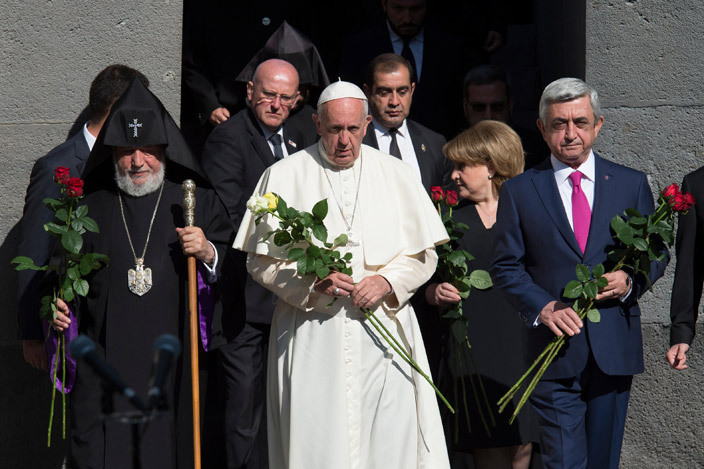Pope visits Armenian genocide memorial
Jun 25, 2016
"May God protect the memory of the Armenian people! Memory cannot be stifled or forgotten! Memory is a source of peace and future!"

Pope Francis on Saturday insisted memory "cannot be stifled" as he visited the main Armenian genocide memorial in Yerevan, on the second day of a trip likely to stir tensions with Turkey.
Francis -- accompanied by President Serzh Sarkisian -- laid a wreath and prayed at the Tsitsernakaberd site where 12 giant stars represent the regions where Armenians says Ottoman forces killed some 1.5 million of their people from 1915 to 1917.
"I pray here, with pain in my heart, that such tragedies will not happen again, that humanity does not forget and knows how to overcome evil with good," Francis wrote in large golden book of commemoration.
"May God protect the memory of the Armenian people! Memory cannot be stifled or forgotten! Memory is a source of peace and future!"
 Pope Francis, accompanied by Armenia's President Serzh Sarkisian (R) and Catholicos of All Armenians Karekin II (L), attending a ceremony in commemoration of Armenians killed by Ottoman forces during World War I at the Tsitsernakaberd Genocide Memorial in Yerevan. / AFP PHOTO / OSSERVATORE ROMANO
Pope Francis, accompanied by Armenia's President Serzh Sarkisian (R) and Catholicos of All Armenians Karekin II (L), attending a ceremony in commemoration of Armenians killed by Ottoman forces during World War I at the Tsitsernakaberd Genocide Memorial in Yerevan. / AFP PHOTO / OSSERVATORE ROMANO
On the first day of his three-day visit Pope Francis on Friday denounced the mass killing of Armenians a century ago by Ottoman forces as "genocide", risking Turkey's fury.
"Sadly this tragedy, this genocide, was the first of the deplorable series of catastrophes of the past century," the pontiff said at the presidential palace in Yerevan.
When Pope Francis last used the term in the Vatican in 2015, on the centenary of the killings, Ankara angrily recalled its envoy from the Holy See for nearly a year.
Armenians have long sought international recognition for the World War I killings as genocide.
Turkey -- the Ottoman Empire's successor state -- argues that it was a collective tragedy in which both Turks and Armenians died.
